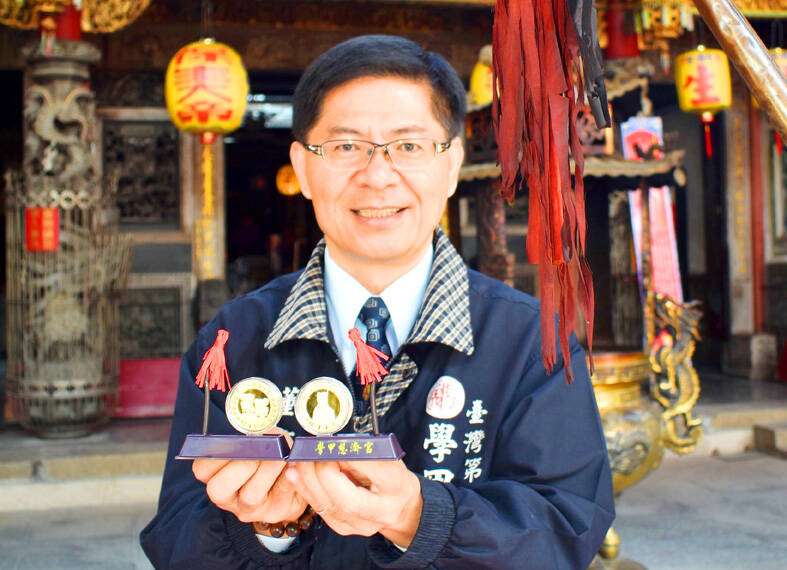Police have detained Wang Wen-tsung (王文宗), chairman of Tainan’s Cihji Temple, and listed him as an additional suspect in two shooting incidents at Democratic Progressive Party-linked sites in the city’s Syuejia District (學甲) in November last year.
Prosecutors accused Wang of harboring criminals, possessing illegal firearms and other offenses, police said, adding that a court has approved their detention request after determining that Wang was a flight risk, might collude with others involved in the case and try to destroy evidence.
Wang was detained after two other suspects in the case, Hung Cheng-chun (洪政軍) and Kung Hsiang-chih (孔祥志), were on Feb. 25 extradited to Taiwan after fleeing to China in the wake of the shootings.

Photo: Yang Chin-cheng, Taipei Times
Early on Nov. 10, Kung allegedly fired 58 shots at the building of a technology firm run by former DPP Central Executive Committee member Kuo Tsai-chin (郭再欽), before firing 30 shots at the nearby campaign headquarters of then-DPP Tainan City Councilor candidate Hsieh Shu-fan (謝舒凡).
Police said Hung told them that Wang had helped him flee.
Wang allegedly traveled twice to China to arrange accommodation for Hung, subsidized his living expenses and provided him with mobile phones, police said.
On Saturday, DPP Legislator Wang Ting-yu (王定宇) wrote on Facebook that Wang Wen-tsung has ties to the Chinese Nationalist Party (KMT).
The temple chairman previously headed the KMT’s Syuejia District office, the Syuejia District Ma Ying-jeou Support Association, a presidential election campaign office of KMT Chairman Eric Chu (朱立倫) and an office of Tainan City Councilor Hsieh Lung-chieh (謝龍介), Wang Ting-yu said.
The temple chairman also acted as head of a local office for the China Unification Promotion Party, he said.
Hsieh Lung-chieh denied that Wang Wen-tsung had been his office head, saying that he only supported his electoral campaign, while maintaining good relations with local politicians of all parties.
KMT headquarters yesterday denied ties between Chu and Wang Wen-tsung, saying that he did not run his presidential election campaign office in 2016, nor that of former president Ma Ying-jeou (馬英九) in 2012.
Additional reporting by Yang Chin-cheng, Wang Chun-chung and Tsai Chung-chu

TRAGEDY STRIKES TAIPEI: The suspect died after falling off a building after he threw smoke grenades into Taipei Main Station and went on a killing spree in Zhongshan A 27-year-old suspect allegedly threw smoke grenades in Taipei Main Station and then proceeded to Zhongshan MRT Station in a random killing spree that resulted in the death of the suspect and two other civilians, and seven injured, including one in critical condition, as of press time last night. The suspect, identified as a man surnamed Chang Wen (張文), allegedly began the attack at Taipei Main Station, the Taipei Fire Department said, adding that it received a report at 5:24pm that smoke grenades had been thrown in the station. One man in his 50s was rushed to hospital after a cardiac arrest

A car bomb killed a senior Russian general in southern Moscow yesterday morning, the latest high-profile army figure to be blown up in a blast that came just hours after Russian and Ukrainian delegates held separate talks in Miami on a plan to end the war. Kyiv has not commented on the incident, but Russian investigators said they were probing whether the blast was “linked” to “Ukrainian special forces.” The attack was similar to other assassinations of generals and pro-war figures that have either been claimed, or are widely believed to have been orchestrated, by Ukraine. Russian Lieutenant General Fanil Sarvarov, 56, head

SAFETY FIRST: Double the number of police were deployed at the Taipei Marathon, while other cities released plans to bolster public event safety Authorities across Taiwan have stepped up security measures ahead of Christmas and New Year events, following a knife and smoke bomb attack in Taipei on Friday that left four people dead and 11 injured. In a bid to prevent potential copycat incidents, police deployments have been expanded for large gatherings, transport hubs, and other crowded public spaces, according to official statements from police and city authorities. Taipei Mayor Chiang Wan-an (蔣萬安) said the city has “comprehensively raised security readiness” in crowded areas, increased police deployments with armed officers, and intensified patrols during weekends and nighttime hours. For large-scale events, security checkpoints and explosives

PUBLIC SAFETY: The premier said that security would be tightened in transport hubs, while President Lai commended the public for their bravery The government is to deploy more police, including rapid response units, in crowded public areas to ensure a swift response to any threats, President William Lai (賴清德) said yesterday after a knife attack killed three people and injured 11 in Taipei the previous day. Lai made the remarks following a briefing by the National Police Agency on the progress of the investigation, saying that the attack underscored the importance of cooperation in public security between the central and local governments. The attack unfolded in the early evening on Friday around Taipei Main Station’s M7 exit and later near the Taipei MRT’s Zhongshan